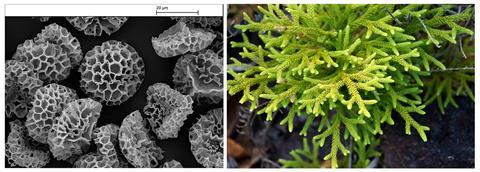Polymer capsule that protects and preserves antimicrobial compound could aid fight against multi-drug resistant pathogens
Empty spores from a herbaceous plant can prolong the effective lifespan of an antibacterial compound by shielding it from UV light, new research shows.
Marine natural product marinomycin A displays antibacterial activity against both methicillin-resistant Staphylococcus aureus and vancomycin-resistant Enterococcus faecium. It has also shown some anticancer activity. However, the molecule contains a polyene motif, which is very unstable in natural light and therefore hindering drug developers from turning it into a viable drug candidate.
Now, a team of researchers has demonstrated that encapsulating marinomycin A in a polymer capsule made from the spores of Lycopodium clavatum can protect it from UV rays and preserve its antibiotic properties. They also showed that the capsule could extract marinomycin A from the microbial fermentation media it had been grown in.

Spores protect genetic material from harsh external environments; they can survive in rocks for millions of years, and can endure high temperatures and intense light. Removing the genetic material from spores leaves an empty capsule. Previous studies have shown that such capsules can envelop and mask the taste of fish oil molecules.
The team hope that by using different sized spores from different species, they can adapt the concept to other bioactive compounds that scientists had abandoned because they were sensitive to light.











No comments yet